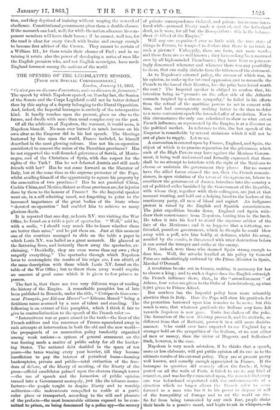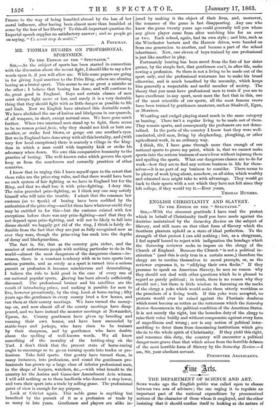THE OPENING OF THE LEGISLATIVE SESSION. [FROM OUR SPECIAL CORRESPONDENT.]
London, January 14, 1863. " Ce n' eat pas an diseours d'ouverture, mais an discours de fermeture." The speech by which Napoleon opened, on Monday last, the Session of the Senate and the Corps Legislatif could not be better defined than by this saying of a deputy belonging to the liberal Opposition. And, indeed, the Imperial harangue is entirely of the retrospective kind. It hardly touches upon the present, gives no clue to the future, and dwells with more than usual complacency on the past.
Of all the adulators of Napoleon, the warmest, it would seem, is Napoleon himself. No man ever burned so much incense on his own altar as the Emperor did in his last speech. The blessings bestowed by him upon the world, France included, he himself described in the most glowing colours. Has not his co-operation contributed to cement the union of the Danubian provinces? Iiaa he not supported the well-founded grievances of Servia, of Monte- negro, and of the Christians of Syria, with due respect for the rights of the Turk? Has he not defeated Austria and still made friends with her? Has he not come forward as the liberator of Italy, but at the same time as the supreme protector of the Pope, whilst availing himself of the opportunity to square his property by the annexation of two provinces ? Has he not punished China, Cochin China, and Mexico, distant as those provinces are, for injuries done by them to the honour of France ? So the Imperial speaker went on, in a self-admiring mood, not forgetting to point to the increased importance of the great bodies of the State whose "devoted co-operation" had enabled him to achieve so many glorious deeds.
It is reported that one day, as Louis XV. was visiting the War Office, he found on a table a pair of spectacles. "Well," said he, with a smile, "I should very much like to know whether these are better than mine," and he put them on. Just at this moment one of the courtiers managed to slide on the table a paper in which Louis XV. was hailed as a great monarch. He glanced at the flattering lines, and instantly threw away the spectacles, ex- claiming, "Decidedly, they are even worse than my own ; they magnify everything." The spectacles through which Napoleon loves to contemplate the results of his .reign are, I am afraid, of the same description with those which Louis XV. found on the table of the War Office ; but to throw them away would require an amount of good sense which it is given to few princes to possess.
The fact is, that there are two very different ways of reading the history of the Empire. A remarkable pamphlet has of late been published in Brussels, under the title, "Critique du Gouverne- ment Francais, par Etienne Marcel"—" Etienne Marcel" being a fictitious name assumed by a man of talent and standing. The following is an extract of this pamphlet, which I think it fair to give in contradistinction to the speech of the French ruler :—
"Intermittent war or peace armed to the teeth—the lives of the French soldiers and the resources of France squandered away in rash attempts at intervention in both the old and the new world— the propaganda of an annexation policy insolently organized among weak nations—a system of general armament on the war footing made a matter of public safety for all the border- ing States. The national debt doubled in the space of ten years—the taxes waxing every year heavier, till they become insufficient to pay the interest of periodical loans—looming bankruptcies, private and public—total extinction of the free- dom of debate, of the liberty of meeting, of the liberty of the press—official candidates palmed upon the electors through terror —the use of speech and the formation of public opinion turned into a Government monopoly, just like the tobacco manu- facture—the people taught to despise liberty and to worship militarism—the malcontents compelled to reside at a parti- cular place or transported, according to the will and pleasure of the prefects—the most honourable citizens exposed to be com- mitted to prison, on being denounced by a police spy—the secrecy of private correspondence violated, and private intercourse inter- fered with—personal liberty made a sport of, and the fatherland dead, as it were, for all but the Bonapartists : this is the balance- sheet (le Ulan) of the Empire."
Will any one acquainted ever so little with the true state of things in France, be tempted to declare that there is no truth in such a picture ? Unhappily, these are facts, not mere words ; and those facts are so well known ; they have so long been mourned over by all high-minded Frenchmen ; they have been so persever- ingly denounced whenever and wherever there was any possibility to do so, that one really shrinks from the triteness of the statement.
As to Napoleon's external policy, the success of which was, in his opinion, to make up for internal oppression and to reconcile the French to the loss of their liberties, has the prize been found worth the cost ? The Imperial speaker is obliged to confess that, his intention being to "promote on the other side of the Atlantic counsels inspired by a sincere sympathy," he failed in his efforts from the refusal of the maritime powers to act in concert with him, and had consequently nothing better to do than to defer to a more convenient epoch the intended offer of mediation. Nor is this circumstance the only one calculated to show to what extent French influence, as represented by the Empire, is at a discount on the political market. In reference to this, the last speech of the Emperor is remarkable by several omissions which it will not be out of place to supply. Let us see.
A convention is entered upon by France, England, and Spain, the object of which is to procure reparation for the grievances which each of the High Powers may have against the Mexican Govern- ment, it being well understood and formally expressed, that there shall be no attempt to interfere with time right of the Mexicans to choose or maintain the government they please. But no sooner have the allied forces crossed the sea, than the French commis- sioners, in open violation of the terms of the agreement, labour to overthrow the government of Juarez, introduce into the country a set of political exiles banished by the Government of the Republic, with whom they, together with their colleagues, arc just at that moment treating, and hold out a helping hand to the leaders of the reactionary party, all men of blood and rapine. An indignant protest is raised by the English and Spanish commissioners. The joint expedition breaks down. England and Spain with- draw their countenance from Napoleon, leaving him in the lurch. He takes it into his head to stand the supreme arbiter of the fate of the Mexicans ; and it so happens that a tottering, un- Mended, penniless government, which he thought he could blow away with a puff, sets him boldly at defiance, whilst his army, assailed by the vomit°, is threatened with utter destruction before it can sound the trumpet and strike at the enemy.
Few, indeed, were those who deemed Spain strong enough to dare him. Well, the attacks levelled at his policy by General Prim are unhesitatingly endorsed by the Prime Minister in Spain, Marshal O'Donnell.
A revolution breaks out in Greece, making it necessary for her to choose a king ; and to such a degree does the English outweigh the French influence there, that,, in the "arrondissement " of Athens, four votes are given to the Duke of Leuchtenberg, ag ainst 9,984 given to Prince Alfred.
But nowhere has the Imperial policy been more miserably abortive than in Italy. How the Pope will show his gratitude for the protection bestowed upon him remains to be seen ; but this much is sure, that whatever gratitude the Italians may have felt towards Napoleon is now gone. Turin has shaken oft-the yoke. The formation of the new M inistry proves it, and its attitude, so different from that of Rattazzi, proves it in a still more decisive manner. Who could ever have expected to see England lay a stronger hold on the sympathies of the Italians, at no cast either of men or money, than the victor of Magenta and Solferino ? Such, however, is the case.
Napoleon is very much mistaken, if he thinks that a speech, more er less elaborate, will put public opinion off its cue as to the ultimate results of his external policy. They are at present pretty well known, and soundly enough appreciated in France. If the harangue in question did scarcely affect the funds ; if, being posted on all the walls of Paris, it failed to craite any kind of sensation, and was hardly commented upon, the reason is that every one was beforehand acquainted with the embarrassments of a situation which no longer allows the French ruler to come forward as a man who has it in his power to dispose at will of the tranquillity of Europe and to set the world on fire. So far from being tormented by any such fair, people shake their heads in a pensive mood, and begin to ask in whispers,—Is
France in the way of being humbled abroad by the loss of her moral influence, after having been almost more than humbled at nome by the loss of her liberty? To this all-important question the Imperial speech supplies no satisfactory answer ; and so people go on saying, " Cc serait trap de moitie.."
A FREEMAN.































 Previous page
Previous page